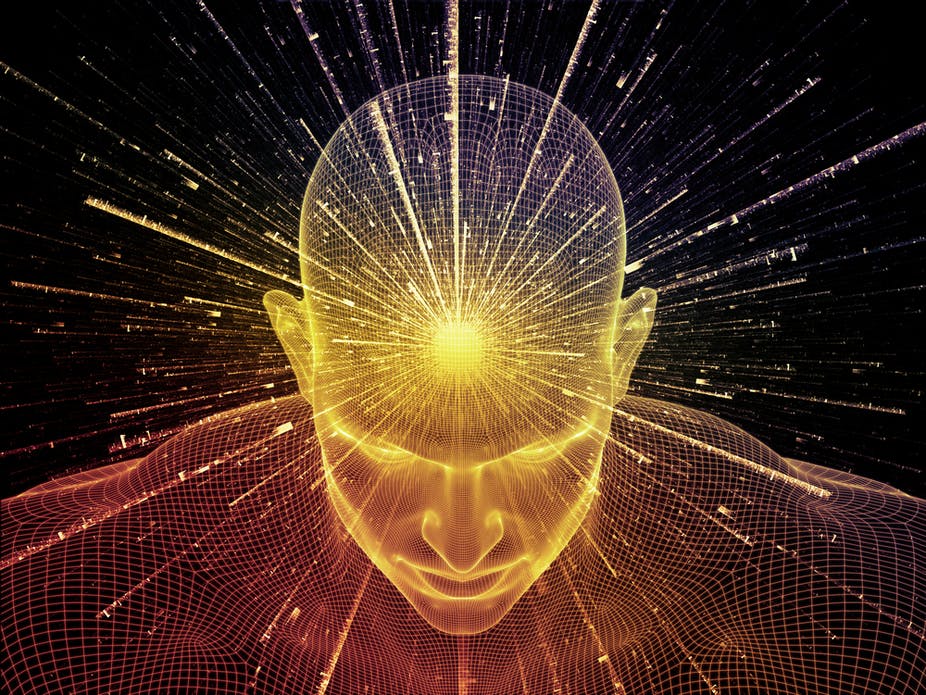a few more ideas involving psychology
-
a few more ideas involving psychology
What is impulse? Is it typically acted upon without much thought? What of how we sometimes decide to suppress or even act opposite to a given impulse? What of how we often have more than one impulse, though at different times? Often, what we know and believe seems highly involved with our emotions. We’ve usually had the time to consider and reflect upon them, to where we’ve found ourselves comfortable and “used to them”.
Our emotions seem “automatic”, whereas thoughts tend to seem more conscious and deliberate. Though, how is it that our emotions and thoughts seem to connect with and accompany each other? Whenever we experience a given mood, we tend to look at the world with a corresponding view. We often see more of what we look for. Whenever we have “conflicting” impulses, we usually quickly decide upon one, while the other is set aside, at least temporarily.
<font color=”#000000″>We tend to find connections through similarities, of what various ideas </font>seem to have in common. Any thought we think, or object we see, or sound or word we hear, of what all we perceive, about literally <i style=”background-color: transparent; font-family: inherit; font-size: inherit;”>anything, will inevitably remind us of <i style=”background-color: transparent; font-family: inherit; font-size: inherit;”>something else, which thereafter connects with ideas we have already established within our minds. Of course, there is the vast interconnected web of ideas, of all knowledge, which is a similar factor to this process.
Within our minds exist countless memories, readily available for immediate recall. We <font color=”#000000″ style=”background-color: transparent; font-family: inherit; font-size: inherit;”>tend </font><font color=”#000000″ style=”background-color: transparent; font-family: inherit; font-size: inherit;”>to </font><font color=”#000000″ style=”background-color: transparent; font-family: inherit; font-size: inherit;”>impulsively think, feel, and act </font>according to how we and a variety of other sources have conditioned our minds. However, much of this isn’t permanent, as we find ourselves gaining and losing various habits and routines, that we at least find ourselves to occasionally reorient our lives, goals, ideas, values, and priorities.
<font color=”#000000″>Our minds </font>seem inherently geared towards forming and categorizing memories of our experiences. We appear to have the almost unlimited capacity to store and retrieve data <font color=”#000000″ style=”background-color: transparent; font-family: inherit; font-size: inherit;”>whenever called upon, immediately and maybe subconsciously, </font>what possibly seems almost involuntary searching, at least at first, for what is most prominently relevant.
<font color=”#000000″>Whenever we experience or perceive something “new”, our minds tend </font>to almost instantly find a way to label or identify, or to describe accurately, if possible, what the new phenomena actually is, and how it correlates with <font color=”#000000″ style=”background-color: transparent; font-family: inherit; font-size: inherit;”>what is </font>already known and established in our minds, through our personal <font color=”#000000″ style=”background-color: transparent; font-family: inherit; font-size: inherit;”>past references, which we’ve learned about through countless </font>experiences.
<font color=”#000000″>All of the knowledge that is known, is known by everyone in a different way </font>than everyone else. At least slightly. We tend to have our own “personal <font color=”#000000″ style=”background-color: transparent; font-family: inherit; font-size: inherit;”>definitions” for just </font>about everything we know, which were arrived at through our very own personal and unique experiences, of a “person, place, or thing”. For instance, that last sentence there reminds me of learning that phrase studying grammar at school early in my life.
<font color=”#000000″>Does every “concrete” or strong science inevitably boil down to physics? </font>Of course, there is applied, experimental, and theoretical physics, also, <font color=”#000000″ style=”background-color: transparent; font-family: inherit; font-size: inherit;”>directly </font><font color=”#000000″ style=”background-color: transparent; font-family: inherit; font-size: inherit;”>physics-related, there is </font>astronomy, astrophysics, ch<wbr style=”background-color: transparent; font-family: inherit; font-size: inherit;”>emistry, and the earth and planetary sciences, such as geology, and possibly somewhat more physically complex, of dealing with living beings, biology, etc.
What of the alleged inadequacy of psychological and social sciences? If they’re truly inadequate, have psychological ideas always been and <font color=”#000000″ style=”background-color: transparent; font-family: inherit; font-size: inherit;”>always </font><font color=”#000000″ style=”background-color: transparent; font-family: inherit; font-size: inherit;”>will exist only as faulty or unverifiable ideas? What of the </font>commonalities that exist quite predominantly, and how the scientific method has been applied there, and could possibly always continue to have the <font color=”#000000″ style=”background-color: transparent; font-family: inherit; font-size: inherit;”>capacity to reach some </font>further accurate conclusions?
The approach and inquiry into a given psychological hypothesis or theory is often quite precisely and expertly orchestrated. Through much thought, observations, and experiments, psychology has at least stumbled across <font color=”#000000″ style=”background-color: transparent; font-family: inherit; font-size: inherit;”>some </font>quite valid and profound truths, much of which has found much success, while steadily growing within popularity through the past quite a few decades. This valuable knowledge of psychology is often accomplished within the form of “self-improvement”, which has often applied to living life proactively and creatively.
<font color=”#000000″>These types of worthwhile knowledge we have available, through books, videos, </font>seminars, and the internet. Some of these valuable ideas could provide us with strategies to further develop goals and plans for the future, with insights of how to find more success and happiness. Actually, most self-improvement books tend to convey various psychological ideas, which when adequately organized and presented well, could further apply well to many of the aspects of our lives.
<font color=”#000000″>What about some possible ideas to achieve levels of excellence within valuable endeavors, </font>of applying types of philosophy to our lives and views of the world, with the intention to help improve our lives and social conditions throughout the world? Consider the vast value of countless ideas found within choice mind-expanding books. Practically any interest, goal to set, capability to develop, ideas to learn about, we have available countless books written by individuals who want to share their ideas so we could add value to our own lives.
Sorry, there were no replies found.

